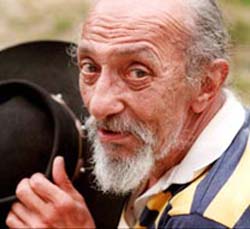THE SUPPRESSED SPEECH OF
WAMSUTTA (FRANK B.) JAMES, WAMPANOAG
To have been delivered at Plymouth, Massachusetts, 1970

Wamsutta (Frank) James
Image from: http://plymouthdailynews.com/first-national-day-mourning-1970-12580
ABOUT THE DOCUMENT:
Three hundred fifty years after the Pilgrims began their
invasion of the land of the Wampanoag, their "American" descendants
planned an anniversary celebration. ...The anniversary planners thought it would be nice to have an
Indian make an appreciative and complimentary speech at their state
dinner. Frank James was asked to speak at the celebration. He accepted.
The planners, however, asked to see his speech in advance of the
occasion, and it turned out that Frank James' views — based on history
rather than mythology — were not what the Pilgrims' descendants wanted
to hear. Frank James refused to deliver a speech written by a public
relations person. Frank James did not speak at the anniversary
celebration. If he had spoken, this is what he would have said:
I speak to you as a man -- a Wampanoag Man. I am a proud man, proud of my ancestry, my accomplishments...
It is with mixed emotion that I stand here to share my thoughts. This is a time of celebration for you - celebrating an anniversary of a beginning for the white man in America.... It is with a heavy heart that I look back upon what happened to my People.
Even before the Pilgrims landed it was common practice for explorers to capture Indians, take them to Europe and sell them as slaves for 220 shillings apiece. The Pilgrims had hardly explored the shores of Cape Cod for four days before they had robbed the graves of my ancestors and stolen their corn and beans. Mourt's Relation describes a searching party of sixteen men. Mourt goes on to say that this party took as much of the Indians' winter provisions as they were able to carry.
Massasoit, the great Sachem [leader] of the Wampanoag, knew these facts, yet he and his People welcomed and befriended the settlers of the Plymouth Plantation. ...This action by Massasoit was perhaps our biggest mistake. We, the Wampanoag, welcomed you, the white man, with open arms, little knowing that it was the beginning of the end; that before 50 years were to pass, the Wampanoag would no longer be a free people.
...And so down through the years there is record after record of Indian lands taken and, in token, reservations set up for him upon which to live. The Indian, having been stripped of his power, could only stand by and watch while the white man took his land and used it for his personal gain....
History wants us to believe that the Indian was a savage,
illiterate, uncivilized animal. ...Let us remember, the Indian is and
was just as human as the white man. The Indian feels pain, gets hurt,
and becomes defensive, has dreams, bears tragedy and failure, suffers
from loneliness, needs to cry as well as laugh.
...Our spirit refuses to die. Yesterday we walked the woodland paths and sandy trails. Today we must walk the macadam highways and roads. We are uniting. We're standing not in our wigwams but in your concrete tent. We stand tall and proud, and before too many moons pass we'll right the wrongs we have allowed to happen to us.
...You the white man are celebrating an anniversary. We the Wampanoags will help you celebrate in the concept of a beginning. It was the beginning of a new life for the Pilgrims. Now, 350 years later it is a beginning of a new determination for the original American: the American Indian.
...Wamsutta
September 10, 1970
Adapted from: http://www.uaine.org/wmsuta.htm